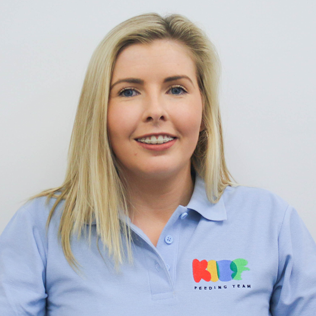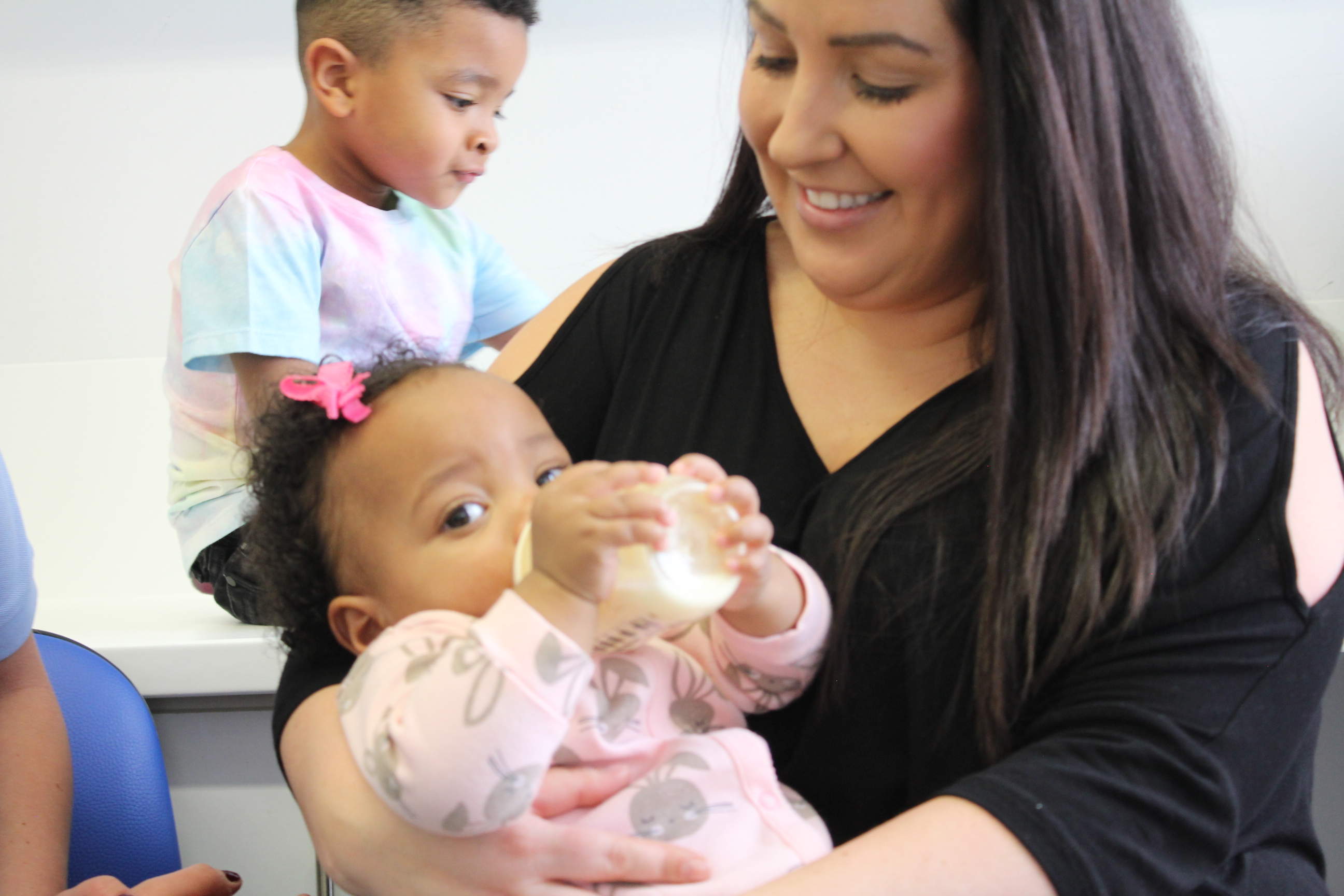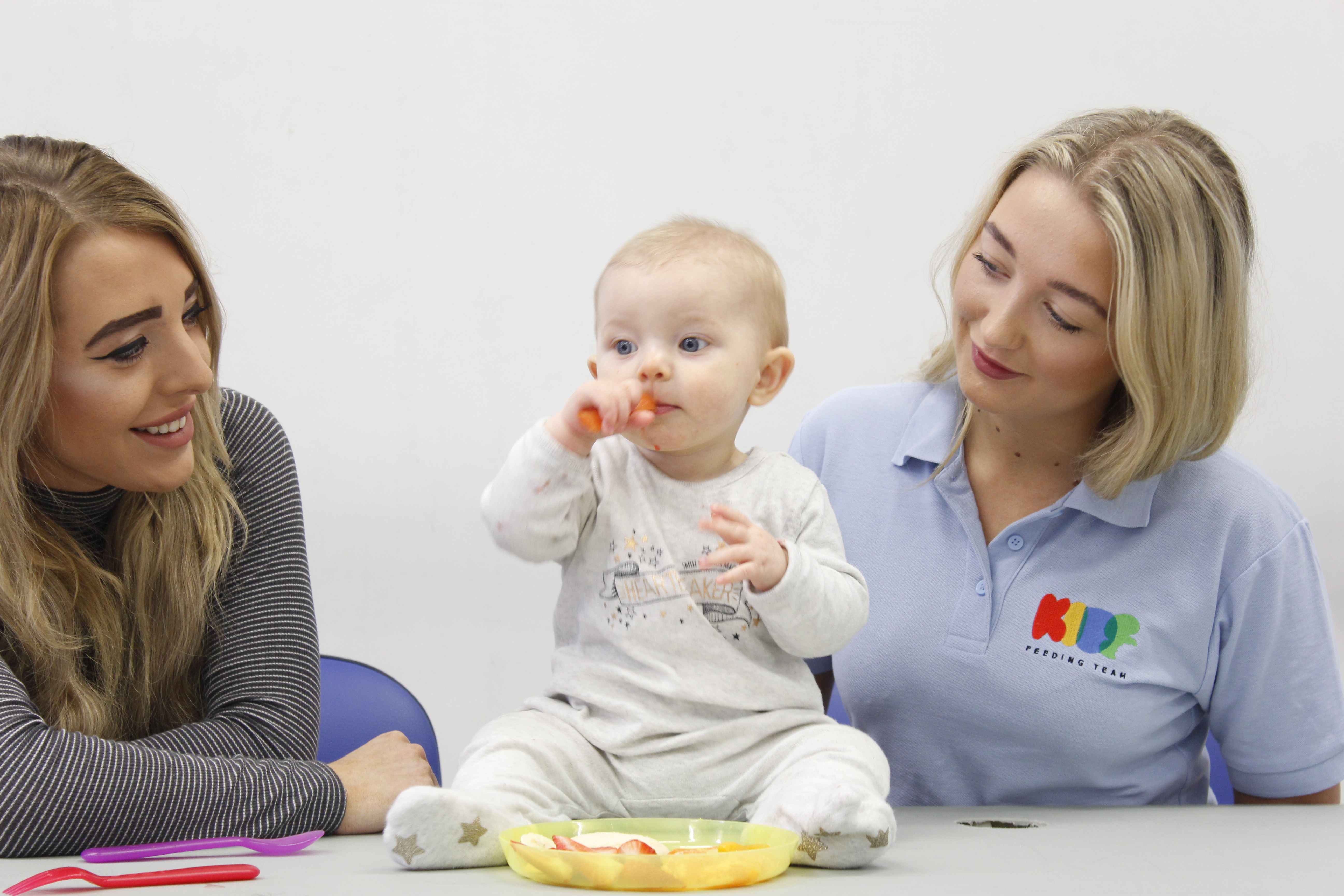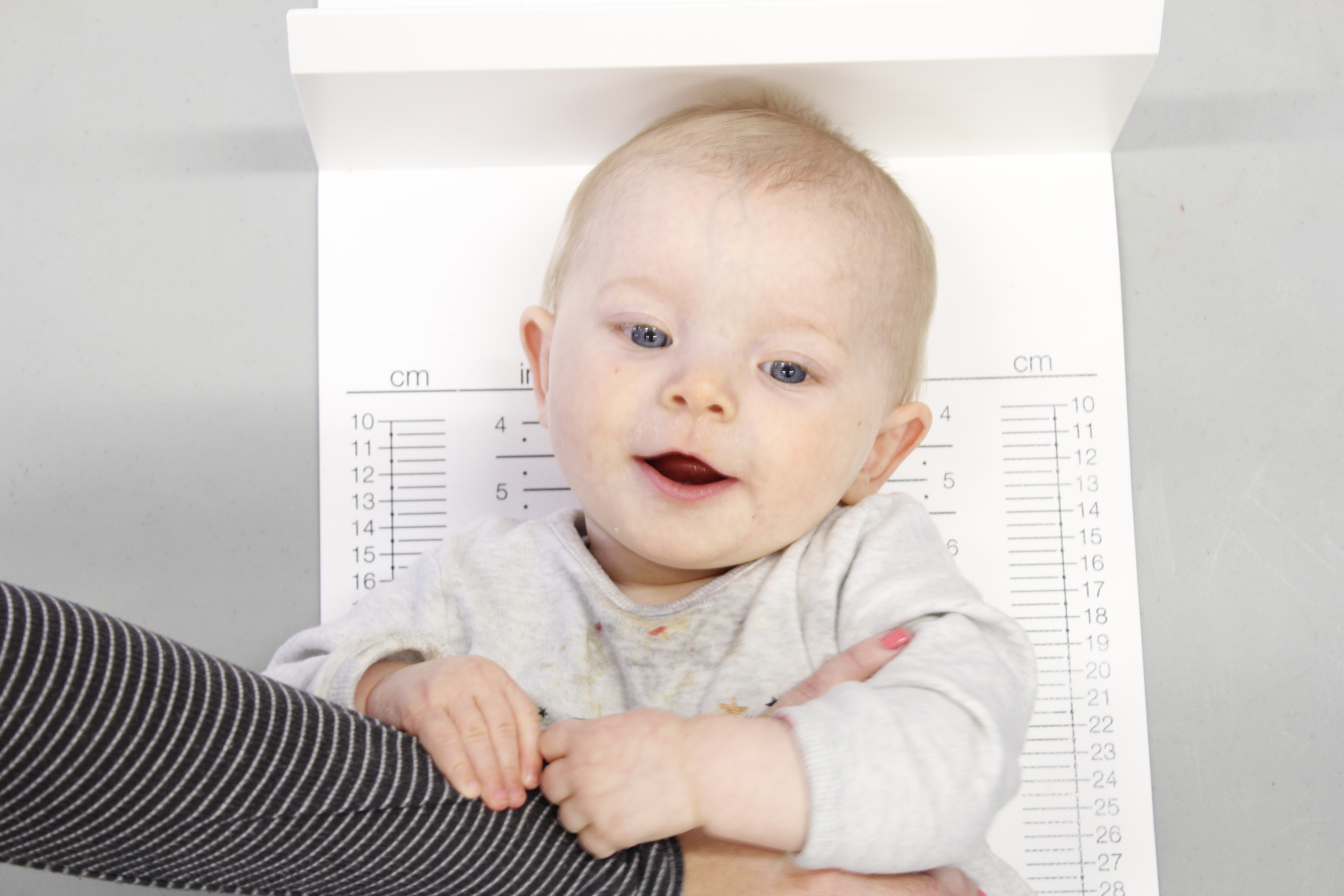Speech and language therapy is the management of muscles within the mouth
and throat which help somebody communicate, eat or drink. Speech and
language therapy not only provides treatment, support and care for children
who have difficulties communicating but also have the expertise to help
children who have difficulties swallowing.
Swallowing is a complex process which requires many different muscles
making intricate movements simultaneously in the mouth and throat.
Swallowing difficulties create an immediate impact on a child's ability to
eat and drink safely or effectively. Swallowing difficulties can also cause
an impact on a child's eating and drinking ability after they have resolved
due to fear of choking or lack of confidence in eating which has developed
from previous negative experiences with swallowing.
What role does a speech and language therapist play in a multidisciplinary
feeding clinic service?
Our speech and language therapists at the Kids Feeding Team help any baby
or child who has swallowing difficulties. Their role is to improve, support
and develop your infant's swallow and with the overall aim of maximising
their ability to eat and drink as safely and effectively as possible. Our
speech and language therapists will support the dietitian in our feeding
clinic consultations, allowing them to devise a treatment plan suited to
your child or baby's needs. Your baby or child may be having difficulties
with gathering, sucking, biting, chewing or swallowing their food and
drink, which is causing a reduced intake of food. Due to this complex
process, we offer a multidisciplinary service so your child can get an
holistic treatment plan from our team of dietitians, speech and language
therapists, occupational therapists and physiotherapists.

Meet Niamh...
Niamh is our committed Specialist Paediatric Dietitian who has experience in both the
NHS and private sectors. She understands the complex needs of each individual child
and their family to provide patient centred care which is results-focused, evidence based
and personable.
When would a child benefit from seeing the Kids Feeding Team speech and
language therapist?
If your child is showing any signs of difficulty with eating, feeding and
swallowing they would benefit from seeing our speech and language
therapist. Here are some possible indicators of swallowing difficulties in
babies and children:

Jada being fed bottle by mum
-
Stiffening or arching of the body whilst feeding.
-
Coughing or choking during or after feeding, eating or drinking.
-
Lacking alertness or irritability during feeding.
-
Recurring chest infections or pneumonia.
-
Regurgitating food / liquid frequently during feeding.
-
Taking longer than thirty minutes for a feed.
-
Taking a long time to complete a meal.
-
Difficulty accepting new textures.
-
Excessive leakage of liquid or food from the mouth.
-
Being sick, gagging or coughing during or after eating and
drinking.
-
Gurgly voice quality during or shortly after feeding.
Having an eating, feeding and swallowing difficulty will have a major
impact on your baby or child. If left untreated, it can lead to serious
medical complications including:
-
Chest infections
-
Aspiration pneumonia
-
Faltering growth
-
Psychosocial issues
-
Malnutrition
Speech and language therapy is highly beneficial in helping to manage
eating, feeding and swallowing difficulties to prevent any further health
complications.
How does a speech and language therapist help children with nutritional or
eating issues?
As part of a multidisciplinary service at Kids Feeding Team, speech and
language therapy will aim to improve, develop and support any eating,
feeding and swallowing difficulties in your infant or child. Speech and
language therapy will maximise the child's ability to eat and drink as
safely and independently as possible, minimising the risk of any associated
health complications. The speech and language therapist will work to
strengthen and co-ordinate the movements of the mouth and throat to ensure
a safe and effective swallow.

Albie on table with mum and Saffron
What are the common conditions speech and language therapy may be involved
in within our feeding clinic service?
There are some conditions that are commonly associated with swallowing and
feeding difficulties as follows:
-
Neurological problems (head injury, stroke)
-
Autism
-
Cerebral palsy
-
Gastrointestinal conditions (e.g. reflux or short gut syndrome)
-
Premature birth and / or low birth weight
-
Cleft lip and / or palate
-
Muscle weakness and / or head and neck abnormalities
-
Respiratory difficulties
-
Medications which induce tiredness or decreased appetite
If you are unsure if your child would benefit from speech and language
therapy input please, Contact us.
What does a speech and language therapy assessment involve?
Following an initial assessment with the dietitian, they will decide
whether it is appropriate for your child to see our speech and language
therapist or not. If so, our speech and language therapist will devise an
individualised treatment plan which will be tailored to the child's
specific swallowing needs and abilities. Swallowing is a complex activity
which requires the involvement of numerous muscles, mental function and
nerves. The assessment will include:
Oral stage
The oral stage is the initial chewing, sucking and moving food or liquid in
the mouth, which occurs in preparation for the food to enter the throat.
Infants who have underdeveloped muscles may struggle with this, leaving
food at the front of the mouth and unable to move it around. The speech and
language therapist may do some movement activities with your child to
observe their ability to move different parts of their mouth and control
their food or drink.
Pharyngeal stage
The pharyngeal stage is responsible for triggering the swallow. During the
pharyngeal stage, food and liquid is pushed through the throat to allow for
entry into the stomach. The airway is closed off during this stage to
prevent food from entering the airway. If the muscles involved with this
stage become dysfunctional, food and liquid may enter the airway, known as
aspiration. Aspirating food and liquid is dangerous and may cause chest
infections and pneumonia. The speech and language therapist may do
activities to feel and hear the child's swallow to see if they can identify
the specific problem.
Oesophageal stage
The oesophagus is the tube which connects the throat to the stomach. In
this phase, the muscles of the oesophagus relax and tighten to allow the
food and liquid to move down and into the stomach. The speech and language
therapist will assess your child's symptoms to identify whether there is a
problem in the oesophageal stage of the swallow.
Eating, feeding and swallowing problems can occur at any of the above
stages and have the possibility to cause numerous health problems if left
untreated. Through infancy and childhood the muscles responsible for these
stages of swallowing are continuously developing. If you're worried your
child may be having difficulties with swallowing, Contact us.
What type of speech and language therapy treatment is available for
children with nutritional or eating issues?
Treatments available for babies and children with eating, feeding and
swallowing difficulties delivered by ur speech and language therapist,
include:
-
Diet modification, which includes altering the textures of food and
liquids.
-
Advice, support and training on positioning during feeding, eating
and drinking.
-
Advice and training on the amount, frequency and types of food
given.
-
Education on the signs of aspiration and also any other
difficulties.
-
Oral- motor exercises to strengthen the muscles involved in eating,
feeding and swallowing.
-
Advice, support and training for parents / carers and other
professionals involved in the baby / child's care.
-
In more severe cases where a baby or child cannot eat or drink at
all the speech and language therapist will discuss alternative ways
of feeding e.g. a feeding tube with the parents / carers and other
professionals.
Our accredited staff will assess your child and decide which treatment is
best suitable for your child and family.
Summary
At the Kids Feeding Team our specialist speech and language therapists help
to improve your infant's ability to swallow more effectively and safely, to
ensure malnutrition is prevented. We aim to reduce the risk of aspiration
and increase the child's nutritional status so you and your family can
relieve any stress and anxiety that may surround mealtimes. If you would
like more information and think the Kids Feeding Team could help you,
please Contact us.












